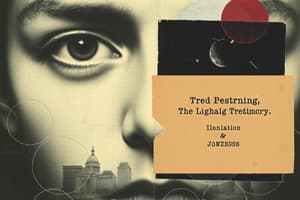Podcast
Questions and Answers
What is the primary focus of the weapon focus effect in eyewitness memory?
What is the primary focus of the weapon focus effect in eyewitness memory?
What distinguishes episodic memory from semantic memory?
What distinguishes episodic memory from semantic memory?
What role do schemas play in memory according to Bartlett?
What role do schemas play in memory according to Bartlett?
In the DRM paradigm, what was a primary finding related to false memories?
In the DRM paradigm, what was a primary finding related to false memories?
Signup and view all the answers
What was a significant finding from Brewer and Treyens' study on schemas?
What was a significant finding from Brewer and Treyens' study on schemas?
Signup and view all the answers
How do inferences during encoding affect memory retrieval?
How do inferences during encoding affect memory retrieval?
Signup and view all the answers
What was the outcome of Loftus et al.'s study involving a gun and a cheque?
What was the outcome of Loftus et al.'s study involving a gun and a cheque?
Signup and view all the answers
What does 'effort after meaning' refer to in Bartlett's research?
What does 'effort after meaning' refer to in Bartlett's research?
Signup and view all the answers
What is a possible reason for attentional blindness during visual tasks?
What is a possible reason for attentional blindness during visual tasks?
Signup and view all the answers
What is a characteristic feature of procedural memory?
What is a characteristic feature of procedural memory?
Signup and view all the answers
What is the main effect of anxiety on memory encoding according to the studies?
What is the main effect of anxiety on memory encoding according to the studies?
Signup and view all the answers
Which statement is true about the fragility of eyewitness testimony?
Which statement is true about the fragility of eyewitness testimony?
Signup and view all the answers
What did Loftus & Palmer's 1974 study reveal about the effect of wording on memory?
What did Loftus & Palmer's 1974 study reveal about the effect of wording on memory?
Signup and view all the answers
What is a major issue with children as eyewitnesses?
What is a major issue with children as eyewitnesses?
Signup and view all the answers
What effect does repeated testing have on eyewitness recall?
What effect does repeated testing have on eyewitness recall?
Signup and view all the answers
What does source misattribution refer to?
What does source misattribution refer to?
Signup and view all the answers
Which factor contributes to the poor accuracy of eyewitness identification?
Which factor contributes to the poor accuracy of eyewitness identification?
Signup and view all the answers
What is one of the best practices for eyewitness identification according to the Innocence Project?
What is one of the best practices for eyewitness identification according to the Innocence Project?
Signup and view all the answers
What does conscious transference refer to in eyewitness memory?
What does conscious transference refer to in eyewitness memory?
Signup and view all the answers
What is the cognitive interview designed to achieve?
What is the cognitive interview designed to achieve?
Signup and view all the answers
What is one reason for the discrepancies in eyewitness testimony from laboratory findings versus real-life scenarios?
What is one reason for the discrepancies in eyewitness testimony from laboratory findings versus real-life scenarios?
Signup and view all the answers
According to research, how does belief in accuracy influence eyewitness recall?
According to research, how does belief in accuracy influence eyewitness recall?
Signup and view all the answers
Which statement about the research on stress and memory is accurate?
Which statement about the research on stress and memory is accurate?
Signup and view all the answers
What is one of the limitations noted in the use of eyewitness testimony in legal situations?
What is one of the limitations noted in the use of eyewitness testimony in legal situations?
Signup and view all the answers
Flashcards
Reconstructive memory
Reconstructive memory
Memory is not a perfect recording, but a reconstruction of past events influenced by inferences and existing knowledge.
Weapon focus
Weapon focus
Eyewitnesses tend to focus on distinctive objects like weapons, neglecting other details. This leads to poorer recall.
Episodic memory
Episodic memory
Long-term memory for personally experienced events. It includes context, time, and place.
Semantic memory
Semantic memory
Signup and view all the flashcards
Schema
Schema
Signup and view all the flashcards
DRM paradigm
DRM paradigm
Signup and view all the flashcards
Change blindness
Change blindness
Signup and view all the flashcards
Bartlett's study
Bartlett's study
Signup and view all the flashcards
Schema effect
Schema effect
Signup and view all the flashcards
Procedural memory
Procedural memory
Signup and view all the flashcards
Bank Robbery Schema
Bank Robbery Schema
Signup and view all the flashcards
Eyewitness Testimony
Eyewitness Testimony
Signup and view all the flashcards
Misinformation Acceptance
Misinformation Acceptance
Signup and view all the flashcards
Suggestibility
Suggestibility
Signup and view all the flashcards
False Memory
False Memory
Signup and view all the flashcards
Children as Eyewitnesses
Children as Eyewitnesses
Signup and view all the flashcards
Cognitive Interview
Cognitive Interview
Signup and view all the flashcards
Source Misattribution
Source Misattribution
Signup and view all the flashcards
Unconscious Transference
Unconscious Transference
Signup and view all the flashcards
Eyewitness Identification
Eyewitness Identification
Signup and view all the flashcards
Confidence and Accuracy
Confidence and Accuracy
Signup and view all the flashcards
Sequential Lineups
Sequential Lineups
Signup and view all the flashcards
Double-Blind Lineups
Double-Blind Lineups
Signup and view all the flashcards
Anxiety and Encoding
Anxiety and Encoding
Signup and view all the flashcards
Schemas and encoding
Schemas and encoding
Signup and view all the flashcards
Study Notes
Reconstructive Memory
- Memory is not a passive recording, but an active reconstruction.
- Inferences are made during encoding.
- Post-event information can influence recall.
- Perspective during retrieval affects memory.
- General knowledge and expectations influence memory.
Attentional Blindness
- Changes can occur during an interruption of attention, but people can miss them.
- Even things in plain sight can be missed.
Eyewitness Memory
- Weapon Focus Effect: Eyewitnesses prioritize the weapon, neglecting other, crucial details.
- Loftus' studies show the significance of the item (e.g., weapon) in leading to identification.
- Details about items, impact stronger identification in certain situations.
- Weapon focus can affect accuracy in witness identification.
Long-Term Memory (LTM)
- Procedural Memory: Skills (motor and cognitive) and classical conditioning effects.
- Declarative Memory:
- Episodic Memory: Personally experienced events, context (time and place).
- Semantic Memory: General knowledge, facts, concepts (no time/place context).
DRM Paradigm
- Lists of associated words lead to false memories (e.g., critical lure recalled).
- Warnings during learning can reduce false memories.
- Participants recall both studied and critical lure words, even with warnings.
Bartlett's Research (1932)
- Memory is an active process of meaning-making and organization.
- "Effort after meaning": Participants actively try to make sense of the material.
- Schemas (knowledge structures) shape encoding and retrieval.
Schemas
- Schemas are cognitive frameworks representing knowledge about the world (e.g., objects, actions, events).
Schemas in Everyday Life
- Brewer & Treyens (1981): Schema consistency affects recall.
- Schema consistent items are recalled better, and consistent false memories are more likely.
Schemas and Confirmation Bias
- Schemas can lead to memory distortions based on expectations.
- Tuckey & Brewer (2003) study found memory of bank robbery included more elements from bank robbery schemas.
Effects During Encoding: Anxiety
- Pickel (1999): No significant effect of threat on memory accuracy in a controlled study.
- Yuille & Cutshall (1986): Found opposite conclusion in real life experiment.
- Other research (e.g., Deffenbacher et al., 2004; Schwabe & Wolf, 2010) showed varying results on the effect of stress.
Effects During Encoding: Reduced Attention
- Attentional factors impact encoding accuracy.
Information After the Event
- Loftus & Palmer (1974): The phrasing of questions after an event can drastically affect eyewitness accounts.
- Misinformation acceptance increases with time.
- Belief, vividness, speed, and intensity of experience impact memory susceptibility but do not correlate with accuracy.
Effects of Wording and Suggestibility
- Loftus and Zanni (1975): Different wording in questions produces different answers.
False Memories
- Creating false memories is possible.
Children as Eyewitnesses
- Children are more suggestible and their cognitive abilities are limited.
- Interview techniques should be bias-free and consider contexts; repeated testing can impact both accuracy and suggestibility.
Familiarity vs. Recollection
- Tulving (1985) distinguished between familiarity (knowing) and remembering (recollection).
Misattribution & Transference
- Source misattribution: Incorrectly identifying the source of a memory.
- Unconscious transference: Mistaken identification based on familiarity.
- Preventing errors is possible by informing witnesses of disconnections between people in their memories.
Eyewitness Identification
- Eyewitness accuracy is often low.
- Sequential line-ups and warnings improve identification accuracy when witnesses don't have to choose the best.
Innocence Project
- Eyewitness identification best practices for improving accuracy and avoiding mistakes.
Cognitive Interview
- A method to enhance eyewitness recall through context reinstatement, complete reporting, varied recall orders and perspectives.
Existing Influences on Identification
- People have difficulty remembering unfamiliar faces.
- Own-race bias in identification.
Belief in Eyewitness Testimony
- Jurors and others sometimes overestimate eyewitness reliability.
Laboratory vs. Courtroom
- Laboratory studies may underestimate or overestimate eyewitness flaws.
- Should research be told to jurors?
Studying That Suits You
Use AI to generate personalized quizzes and flashcards to suit your learning preferences.
Description
This quiz explores key concepts in psychology related to memory such as reconstructive memory, attentional blindness, and eyewitness memory. It highlights the complexities of how memories are formed, retrieved, and influenced by various factors. Test your understanding of these critical psychological principles.




